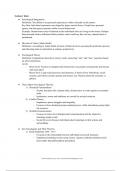Summary
Summary Sociology 101 - Social and Cultural Interaction (SOCI 101) Midterm Solution Guide_2024/2025.
- Course
- SOCI 101 (SOCI101)
- Institution
- University Of British Columbia (UBC )
Section 1 Intro ● Sociological Imagination Definition: The ability to see personal experiences within a broader social context Key Idea: Individual experiences are shaped by larger societal forces. People have personal agency, but that agency operates within a social framework. Example: Home...
[Show more]



